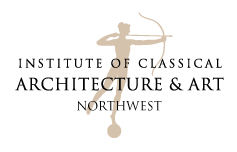DESIGN OF MOLDINGS: Continuum of Precedent & Practice
The study of moldings is a fundamental component of the language or canon of classical architecture. Practicing architect Stephen Chrisman will examine the systematic aspects for the design, delineation and understanding of moldings, for both interiors and exteriors, which are used in professional practice and are based on everlasting scholarship and the exploration of good precedent.
Topics covered will include methodologies for determining the modulated sizes of moldings within a composition, the celebratory ornamental enrichment of molding profiles, and a review of different influential architectural traditions including Greek, Roman, French and Georgian moldings. Materiality, such as wood, plaster and stone, have an impact on the design of moldings and will also be evaluated.
Examples from professional practice will traverse adaptations of the classical molding profiles from masters such as Palladio, Sir Christopher Wren, Sir Edwin Lutyens, to contemporary architects, and illustrate the use and composition of moldings as an ever-present, evolving and elaborative continuum. A conclusive discussion will address the topic of pushing our collective skills and wisdom further by creating future collaborations as an ongoing online “forum” for the advancement of molding design.
Stephen Chrisman is a Principal at Ferguson & Shamamian Architects, New York, where he has worked since 1995. He oversees the design and project management of classical and traditional projects ranging in scale from renovations and additions of historic houses, to large new country houses. He holds a Master of Architecture from the University of Notre Dame, and Bachelor of Architecture from the Oregon School of Design. His teaching focus has been on topics of classical architectural design and composition. Recent courses include: "The Art of The Measured Drawing Sketchbook," and "How to Study Buildings: An Analysis of Architectural Composition and Precedent". Stephen is a long-standing Fellow of the ICAA and serves on the National Education Committee.
DATE: MARCH 4, 2021
TIME: 5:00 p.m. to 6:15 p.m. (PST)
ADMISSION FREE: OPEN TO THE PUBLIC





